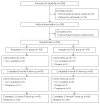A randomized controlled trial on the efficacy of carbohydrate-reduced or fat-reduced diets in patients attending a telemedically guided weight loss program
- PMID: 19615091
- PMCID: PMC2722581
- DOI: 10.1186/1475-2840-8-36
A randomized controlled trial on the efficacy of carbohydrate-reduced or fat-reduced diets in patients attending a telemedically guided weight loss program
Abstract
Background: We investigated whether macronutrient composition of energy-restricted diets influences the efficacy of a telemedically guided weight loss program.
Methods: Two hundred overweight subjects were randomly assigned to a conventional low-fat diet and a low-carbohydrate diet group (target carbohydrate content: >55% energy and <40% energy, respectively). Both groups attended a weekly nutrition education program and dietary counselling by telephone, and had to transfer actual body weight data to our clinic weekly with added Bluetooth technology by mobile phone. Various fatness and fat distribution parameters, energy and macronutrient intake, and various biochemical risk markers were measured at baseline and after 6, and 12 months.
Results: In both groups, energy intake decreased by 400 kcal/d compared to baseline values within the first 6 months and slightly increased again within the second 6 months. Macronutrient composition differed significantly between the groups from the beginning to month 12. At study termination, weight loss was 5.8 kg (SD: 6.1 kg) in the low-carbohydrate group and 4.3 kg (SD: 5.1 kg) in the low-fat group (p = 0.065). In the low-carbohydrate group, triglyceride and HDL-cholesterol levels were lower at month 6 and waist circumference and systolic blood pressure were lower at month 12 compared with the low-fat group (P = 0.005-0.037). Other risk markers improved to a similar extent in both groups.
Conclusion: Despite favourable effects of both diets on weight loss, the carbohydrate-reduced diet was more beneficial with respect to cardiovascular risk factors compared to the fat-reduced diet. Nevertheless, compliance with a weight loss program appears to be even a more important factor for success in prevention and treatment of obesity than the composition of the diet.
Trial registration: Clinicaltrials.gov as NCT00868387.
Figures



References
-
- World Health Organisation (WHO) Obesity and overweight. September 2006 Fact sheet No. 311. http://www.who.int/mediacentre/factsheets/fs311/en/index.html (last accessed 10.09.2008)
-
- Gross LS, Li L, Ford ES, Liu S. Increased consumption of refined carbohydrates and the epidemic of type 2 diabetes in the United States: an ecologic assessment. Am J Clin Nutr. 2004;8:774–779. - PubMed

